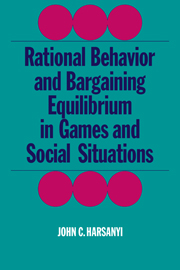Book contents
- Frontmatter
- Contents
- Preface
- Part 1 Preliminaries
- 1 Bargaining-equilibrium analysis: a new approach to game theory and to the analysis of social behavior
- 2 Rational-choice models of social behavior
- 3 Rational behavior under certainty, risk, and uncertainty
- 4 Morality and social welfare
- Part II General principles
- Part III Solutions for specific classes of games
- Notes
- References
- Index
2 - Rational-choice models of social behavior
Published online by Cambridge University Press: 24 November 2009
- Frontmatter
- Contents
- Preface
- Part 1 Preliminaries
- 1 Bargaining-equilibrium analysis: a new approach to game theory and to the analysis of social behavior
- 2 Rational-choice models of social behavior
- 3 Rational behavior under certainty, risk, and uncertainty
- 4 Morality and social welfare
- Part II General principles
- Part III Solutions for specific classes of games
- Notes
- References
- Index
Summary
The rationality assumption
Like other versions of game theory – and indeed like all theories based on some notion of perfectly rational behavior – regarding its logical mode, our theory is a normative (prescriptive) theory rather than a positive (descriptive) theory. At least formally and explicitly it deals with the question of how each player should act in order to promote his own interests most effectively in the game and not with the question of how he (or persons like him) will actually act in a game of this particular type. All the same, the main purpose of our theory is very definitely to help the positive empirical social sciences to predict and to explain real-life human behavior in various social situations.
To be sure, it has been a matter of continual amazement among philosophers, and often even among social scientists (at least outside the economics profession), how any theory of rational behavior can ever be successful in explaining or predicting real-life human behavior. Yet it is hardly open to doubt that in actual fact such theories have been remarkably successful in economics and more recently in several other social sciences, particularly political science, international relations, organization theory, and some areas of sociology [see Harsanyi, 1969, and the literature there quoted].
Needless to say, theories based on some notion of rational behavior (we will call them rational-behavior or rational-choice theories or, briefly, rationalistic theories), just as theories based on different principles, sometimes yield unrealistic predictions about human behavior.
- Type
- Chapter
- Information
- Publisher: Cambridge University PressPrint publication year: 1977
- 1
- Cited by

